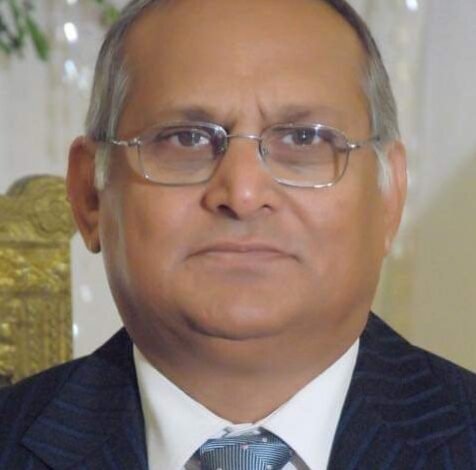A Global Shift of the Soul

By. Ghulam Haider Shaikh
In an age shaped by information overload, global uncertainty, and an ever-deepening search for identity, humanity is undergoing a quiet but powerful transformation. This is not merely a sociological shift but a spiritual and intellectual awakening—a reorientation of human consciousness. Across continents, people are re-evaluating long-held assumptions, questioning inherited traditions, and seeking meaning in a world that increasingly feels devoid of it. In this awakening, one trend stands out with unmistakable clarity: the growing global appeal of Islam, especially in societies that were once the strongholds of secularism or Christianity.
A recent Pew Research Center report, highlighted in the Daily Jang, reveals a striking fact. While Christianity has seen a 1.8% decline in its global population share, Islam has grown by exactly that margin. The ratio of people converting away from Christianity compared to those joining it is staggering: for every new convert, three are leaving the faith. By contrast, Islam is gaining followers in both the East and the West—not merely through birth rates but increasingly through conscious choice. This shift is not just about demographics; it’s about the reawakening of the human spirit.
What drives people in the 21st century—educated, skeptical, and modern individuals—to embrace a faith often portrayed with suspicion in mainstream media? Why are mosques in Europe and North America expanding while churches are closing their doors? The answer lies in a profound internal realization among individuals: material progress has not brought peace, secular ideologies have not provided moral clarity, and technological advancement has failed to satisfy the yearning for purpose. A silent question now echoes within millions of hearts: What truly matters?
This question, born of disillusionment with materialism and ideological confusion, signals a deeper shift—the awakening of consciousness. Individuals are not merely reacting to the failures of systems; they are reaching inward to seek truth that transcends systems. They are rediscovering that fulfillment is not achieved through consumption or status, but through spiritual alignment, ethical living, and connection to a higher reality.
Islam offers a path that resonates with this awakening. Unlike faiths that have undergone substantial compromise with modernity—often at the cost of spiritual depth—Islam retains a firm grounding in both reason and revelation. It proposes a coherent worldview that harmonizes logic and faith, offering intellectual satisfaction alongside spiritual tranquility. It does not demand blind submission but invites rational inquiry. It does not promise an escape from the world, but a framework for engaging with it meaningfully.
This intellectual appeal is crucial. In today’s world, people no longer accept religious dogma simply because it is inherited. They question, investigate, and seek authenticity. For many, Islam stands out as a faith that encourages questioning rather than silencing it. The Qur’an repeatedly invites reflection: “Do they not reflect? Do they not ponder?” In Islam, spirituality is not divorced from thought; it is enriched by it. This approach is especially appealing to young, educated individuals who want their faith to be grounded in reason, not just emotion.
The journey to Islam is often described by reverts not as a conversion, but as a return—a reversion to an innate truth. This concept reflects the Islamic understanding of fitrah, the natural spiritual disposition with which every human is born. Many who embrace Islam say it feels less like adopting a new belief and more like remembering something they always knew but had forgotten. This sentiment is not emotional rhetoric; it is a profound testament to how Islam connects with the core of human nature.
As technology accelerates and artificial intelligence redefines our understanding of self, identity, and consciousness, humanity is forced to confront fundamental questions. If machines can think, what is the essence of human consciousness? If data can predict our behavior, do we still have free will? If science can prolong life, can it ever give meaning to it? Islam provides a unique metaphysical anchor in this storm of uncertainty. It teaches that humans are more than neurons and flesh—we are souls created by a wise Creator, entrusted with purpose and guided by divine wisdom.
The growth of Islam is not limited to the spiritual or philosophical domains; it is becoming a sociocultural phenomenon. In cities across Europe and North America, churches are being sold, abandoned, or converted into condos and cafés. Simultaneously, new mosques are being built—often by donations from within local communities. These are not temporary or superficial gestures; they represent a deeper shift in societal conscience. Where traditional institutions have failed to answer questions of meaning, Islam is offering both answers and community.
This development should not be viewed through the lens of fear or competition. The rise of Islam is not the fall of others—it is the return of humanity to balance. For too long, the modern world emphasized individualism, instant gratification, and moral relativism. Now, people are seeking discipline, structure, and transcendence. Islam is not merely growing because of birth rates. It is growing because it resonates with awakened minds and searching hearts.
However, this growth comes with responsibility. Muslims cannot afford complacency. If people are drawn to Islam because of its depth, clarity, and beauty, then it is incumbent upon Muslims to embody those very qualities. Character must reflect the message. Integrity must match the ideals. Communities must be welcoming, knowledgeable, and inclusive. Islam’s greatest advocates are not its scholars or preachers—but its practicing, humble, and sincere followers whose lives reflect the light of the teachings they uphold.
In the end, the rise of Islam in this era is not just a demographic event—it is a sign of something deeper. It is the rebirth of human conscience, the resurgence of moral clarity, and the recognition that truth is timeless. The Qur’an describes itself as a reminder, not a novelty. Perhaps this is why so many describe their journey to Islam as a return—not to a culture, but to a truth that predates time.
As the world confronts new crises—climate, conflict, identity, and technological disruption—the hunger for grounded meaning will only intensify. Islam, with its balance of reason and revelation, offers a path not only to spiritual peace but to a conscious civilization. This is the moment for Muslims to rise—not in triumphalism, but in service to humanity’s awakening.





